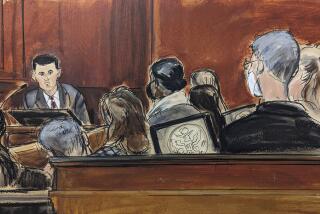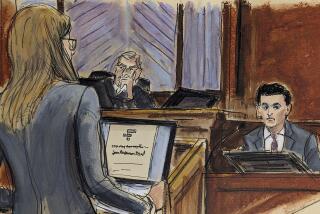Ex-Fannie Mae Accountant Says CEO Knew of Concerns
- Share via
The former Fannie Mae accountant who raised questions about the mortgage giant’s bookkeeping said Wednesday that he took his concerns directly to Chief Executive Franklin Raines in 2002 and asked him to investigate.
The disclosure by Roger Barnes, who left Fannie Mae in October 2003, came as Raines and Chief Financial Officer Timothy Howard defended the company’s accounting and told Congress that regulators’ allegations of earnings manipulation represented an interpretation of complex rules.
At a House subcommittee hearing, Raines and Howard testified under oath in their first public appearance since news surfaced Sept. 22 about the allegations and a Securities and Exchange Commission inquiry into government-sponsored Fannie Mae. Lawmakers questioned them closely about an instance in 1998 in which accounting rules were said to have been deliberately violated so that top executives could collect full bonuses.
“This is a very serious allegation, and I deny that it occurred,” Raines testified.
The bonuses were tied to an earnings-per-share target of $3.23 for Fannie Mae stock that year -- and company profit came within pennies of that goal.
Shares of Fannie Mae, which finances one of every five home loans in America, have lost some $14 billion in value since the allegations of accounting improprieties came to light. They rose $1.45 to $67.45 on Wednesday on the New York Stock Exchange. The shares have fallen about $10 in the last month.
The regulators in the Office of Federal Housing Enterprise Oversight have said that information provided by Barnes, who was a manager in the Controller’s Division, was important to their investigation of the company’s accounting.
“I urged Mr. Raines and Mr. Howard to investigate the issues identified,” Barnes said in written testimony submitted for a hearing by the House Financial Services subcommittee that oversees Fannie Mae and Freddie Mac, its smaller rival in the multitrillion-dollar home mortgage market.
Barnes did not appear before the panel, but his written testimony was distributed to reporters.
“Neither Mr. Raines nor Mr. Howard, nor anyone from their staffs, investigated these concerns or took corrective action,” he said. “Thus, the practices I had identified continued, and I faced continuing reprisal for raising concerns about these issues.”
At Fannie Mae, Barnes said, “the atmosphere and culture, particularly within the Controller’s Division, is one of intimidation, restraint of dissenting opinions and pressure to be part of the ‘team,’ ” giving Raines and Howard the numbers they sought to please the markets.
Raines insisted that the regulators’ findings, though serious, were arguable interpretations of complex accounting rules.
“These accounting standards are highly complex and require determinations over which experts often disagree,” he said. Raines noted that Fannie Mae’s outside auditor, KPMG, had endorsed the company’s application of accounting rules.
Armando Falcon, director of the Office of Federal Housing Enterprise Oversight, in testifying before the Fannie Mae executives, asserted that Fannie Mae improperly put off booking income to a future reporting period “to create a ‘cookie jar’ reserve that it could dip into whenever it best served the interests of senior management.”
Those interests included smoothing out volatility in earnings from quarter to quarter and meeting earnings-per-share targets linked to bonuses for executives, Falcon said.
More to Read
Inside the business of entertainment
The Wide Shot brings you news, analysis and insights on everything from streaming wars to production — and what it all means for the future.
You may occasionally receive promotional content from the Los Angeles Times.










